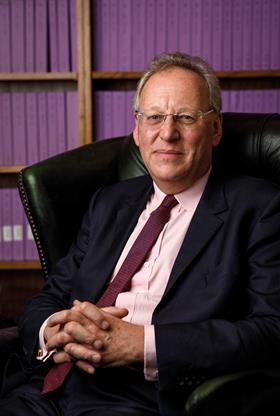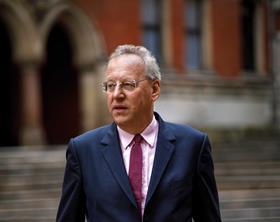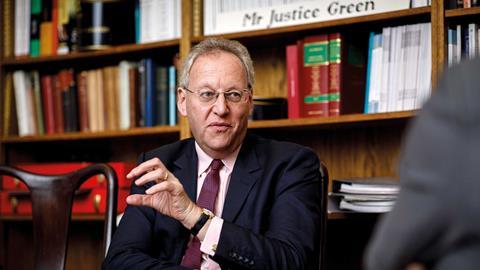As a youth he excelled in the pool, but Law Commission chair Sir Nicholas Green went on to make waves in the law and legal politics. Nick Kochan spoke to him
BIOG
BORN: Birmingham
EDUCATION: LLB, University of Leicester; LLM, University of Toronto; PhD, University of Southampton
ROLES: Brick Court Chambers, 1990-2013 (QC, 1998; joint head of chambers, 2011-2013; head of chambers 2013); chair of the Bar Council, 2010; chair of Advocacy Training Council, 2011-2015; Judicial Appointments Commission, 2016-2020; Court of Appeal, 2018; chair of the Law Commission, 2018
PUBLICATIONS: Commercial Agreements and Competition Law: Practice and Procedure in the UK and EEC (1986); The Legal Foundations of the Single European Market (1992). Numerous articles on (among other things) international law, administrative law, commercial law and intellectual property
KNOWN FOR: Law Commission chair
‘The Law Commission was a stuffy organisation when I was young,’ says Sir Nicholas Green, the statutory body’s 62-year-old chairman. ‘Now our people are young and our programmes forward-looking and relevant. I am the oldest one in the office.’
The commission was founded in 1965 by Lord Scarman, ‘to keep the law of England and Wales under review and to recommend reform where it is needed’. Its workload remains hefty.
This distinguished stalwart of the English bar lists some of the commission’s current and recent research projects. They include an examination of risk procedures governing the handling of the next crisis after the pandemic; an investigation into the legal status of the Bitcoin; scrutiny of moral issues arising from self-driving vehicles; researching changes to the application of criminal corporate liability; and a shakeup of laws governing marriages and burials.
'Whenever we get a crisis, legislation is insufficient to give government properly controlled powers to cope'
Green cut his teeth in academia and was chair of the Bar Council in 2010. In 2018, he was appointed to the Court of Appeal and a Privy Counsellor. ‘The sharper we are, the better the response to our consultations,’ he says. ‘We like to be quite refined when we first go out because we then get much better results.’
This rigour and passion should not be confused with pomposity. Green regards no task as too small for his involvement, including helping porters carry heavy parcels to his office at the Royal Courts of Justice. Colleagues speak of his love of legal and political gossip.
He wants to be where the action is – his investigation of legal issues raised by the pandemic being a case in point. ‘Whenever we get a crisis, legislation is insufficient to give government properly controlled powers to cope,’ he comments. ‘So the first few weeks or months are spent panicking, getting legislation in place to enable government to cope. You lose time. We’ve been setting up a team internally, looking at the mechanisms and the techniques that we would need to introduce into legislation to cater for the next crisis.
‘We will be looking at what’s meant by emergency powers. What are the limits and controls? What are the accountability mechanisms? What have we learned from this crisis? What has the government had to do which they could never, ever have thought they needed to do? How can we systematise it in terms of drafting legislation across the whole board in the future? We’ve set up a team looking at this, trying to work out techniques. We’re going to build it into an internal working document.’

‘Staggering figures’
Aware of the political sensitivities surrounding the Law Commission’s public funding, Green hired two academic economists to conduct a review of its financing and a cost-benefit analysis. The economists reported that initial investment in each of the five biggest Law Commission research projects – some £500,000 a project – had paid for itself 2,000 times over, and possibly by much more.
‘These were staggering figures,’ he says. ‘I thought we ought to be parading them.’ The numbers could have been even higher, he adds, but he deliberately gave the economists conservative parameters.
Government saw the strength of the analysis nevertheless. Last November, negotiations concluded with a complete restructuring of the commission’s funding model, as proposed by Green.
Under the settlement, initially negotiated with former lord chancellor David Gauke and latterly with Robert Buckland, the Ministry of Justice will allocate £5m a year to the commission.
Issues pressing down on finance and industry are also set for investigation. One is the legal status of digital currencies. The questions go back to basics, says Green: ‘Is a Bitcoin property, when it’s nothing more than a binary record on your software? It’s not hard currency, but it has value. Is it property as defined in the law? Can you transfer it? Can you sell it? Does it travel under your will? Is it subject to property-related taxes? Nobody knows.’
Self-driving electric vehicles pose highly practical and legal issues. ‘An automatic car on the motorway needs to comply with the rules of the Highway Code,’ Green says. ‘The car’s computer has got to be able to read the rules to be able to understand them. But the rules are not drafted for robots. The Highway Code has concepts such as “use all due care and attention” or “slow down in bad weather”. We have to devise laws which can be read by computers.’
When Green joined the Law Commission in July 2018, the organisation was having problems. Its budget had been cut and its workload was unsustainable. ‘The commission was massively underfunded,’ he says. ‘People were stretched almost beyond endurance, but they were doing extraordinarily good work. Frankly, the pressures were beginning to show and it was at real risk of problems. That was largely because the government had cut the budget by 54%.’
'I said, why don’t we send a document back to the MoJ saying this is ridiculous, you want us to do more and more work, and yet we are breaking at the seams. We demand a review of our financing'
He was determined to put the commission on a sounder financial footing and his approach was typically robust. ‘Why are we so defensive?’, he asked a colleague. ‘Why don’t we basically send a document back [to the Ministry of Justice] saying this is ridiculous, you want us to do more and more work, and yet we are breaking at the seams. We demand a review of our financing.’
The commission was in the unenviable position of having to negotiate with government ministries for whom it provided research over petty amounts of money. ‘We were having to fight for bits and bobs here and there. We were arguing with them over £10,000 or £20,000. It was driving me mad.’
Green is delighted with the new funding arrangements he was able to secure (see box): ‘We did a very good deal. There’s a new memorandum of understanding. The MoJ are not fighting on independence or choice of projects, but they will fund us entirely, 100%.’
This would seem to underpin his assertion that ‘we have become much more politically astute’. Green is helped in his image management for the commission by recent non-executive director appointments. These include Gazette columnist Joshua Rozenberg and Bronwen Maddox, another career journalist, who provide media and political intelligence. The appointment of Baroness Deech, former principal of St Anne’s College Oxford, adds academic clout.
Green honed his political antennae when chair of the Bar Council. He locked horns with Keir Starmer, then director of public prosecutions and head of the Crown Prosecution Service. Starmer was reining in fees paid to out-of-house lawyers, following swingeing budget cuts, and was determined to bring bar work in-house at the CPS.
‘We had a bit of a barney,’ Green says. ‘Halfway through, while he was fulminating, he stopped and said, “forget everything I’ve said in the last five minutes, let’s have lunch”.’
Following that riposte a panel was set up comprising teams from the Bar Council and the DPP’s office to discuss barrister pay. Green found Starmer ‘very rational’ and the teams met regularly and resolved many of those issues. He continues to have great respect for Starmer, of whom he says: ‘He was the best DPP we’ve had in 20 years by a long margin.’ Green also pays tribute to current DPP Max Hill.
Political battles
Green’s political battles have also included taking to task Kenneth Clarke, justice secretary in 2010, who was pushing the coalition’s plans to slash legal aid.
‘I remember going to see Ken Clarke to try putting some backbone into him to resist the cuts. But he said, “it doesn’t make any difference. If I hold out and negotiate hard, the cut might be 24%. If I give in now, it might be 25%”.’ Green secured some marginal improvement, although ‘only a percentage point here and there’.
For Green, the one-year tenure accorded to the chair of the Bar Council is unsatisfactory: ‘You had hardly been introduced to the senior judges before your term was up.’
Green continued to make his mark on the wider legal stage in 2011, when he took over the Advocacy Training Council (ATC). His project to improve courtroom understanding and treatment of individuals such as victims of rape or abuse continues to bear fruit. ‘I really felt very strongly about that,’ he says.
The campaign was prompted by a conversation with a journalist. ‘He’d seen young girls mistreated by defence counsel with judges not knowing what their powers were and prosecution not protecting them,’ Green says. ‘Cross-examination would have gone on for days. He said it was just a shocking experience. We literally decided there and then that we would introduce wholesale training across the bar and [for] the judges.’
Charities, victims organisations and social workers were brought together with senior judges, solicitors and barristers under the auspices of the ATC to advise on solutions. The results were dramatic, with the establishment of training programmes for those handling vulnerable witnesses; the publication of ‘kits’ setting out appropriate behaviour; and the introduction of exams to test understanding. Green oversaw these programmes until 2015, when his term at the ATC expired.
Green was born in Birmingham in 1958 to a Jewish family who were in business. He can speak with a ‘Brum’ accent if called upon. He attended King Edward VI Camp Hill School for Boys, distinguishing himself not for his academic results up to O-level, but rather as a member of the national junior swimming team. He swam butterfly and freestyle at 100 and 200 metres for England but suffered knee injuries and put his head down for A-levels. ‘I did some schoolwork for the first time in my life!’ he remembers.
His academic career took him to Leicester University, where he studied law, and then the University of Southampton, where he did a doctorate in European commercial law. He stayed on to teach. ‘I loved being an academic,’ he says, stressing that there was never any doubt his future lay in the law. A book on European competition law was his passport to pupillage at what was then called Three Grays Inn Chambers.
Green established himself in constitutional law, public law, economic regulatory law, ‘straight’ commercial law and intellectual property. IBM and the Whitbread family were among his early clients.

Thus began his rise up the ranks. He was youngest of his year to get a tenancy, but Green recalls that Lord Mackay of Clashfern, who officiated at his swearing-in, whispered in his ear that he, in fact, had been younger.
He gained pupillage at Brick Court Chambers in 1986, aged 28, took silk in 1998 and became joint head of chambers in 2011. He then became the sole head when Jonathan Sumption QC was appointed to the Supreme Court a year later.
Much of Green’s professional work has taken him abroad. The Office of Fair Trading introduced him to the government of Hong Kong in the early 2000s and Green made many visits over the decade. He acted for the broadcasting authority and others in areas such as public law, economic regulation, broadcasting, telecoms and commercial law.
While largely pursuing commercial issues, Green enjoyed serving as a recorder at Crown courts. ‘I loved sitting as a recorder,’ he says. ‘I did it for 10 years doing grubby crime down at Snaresbrook. The things defendants said left me absolutely amazed. It was an education in every sense of the word. The first time I had to send someone to prison, I remember lying awake at 2am, agonising over it. I was sending this burglar down for three years. I think he was rather surprised that he didn’t get five. So he thanked me.’
Nick Kochan is a freelance journalist
































No comments yet